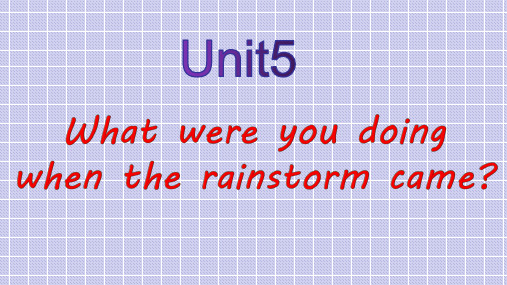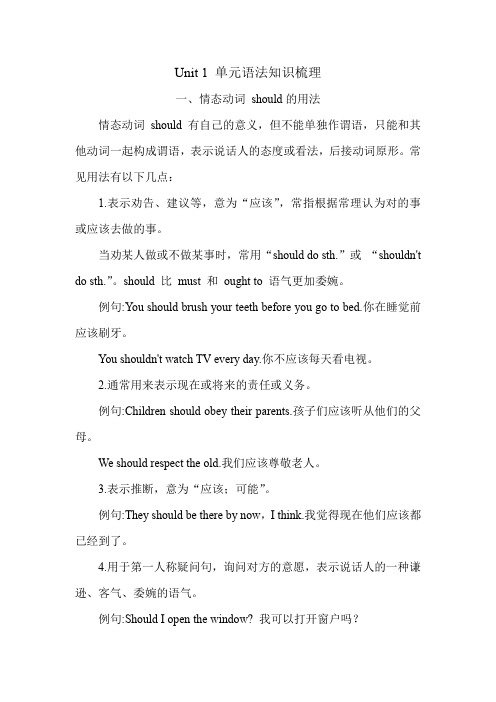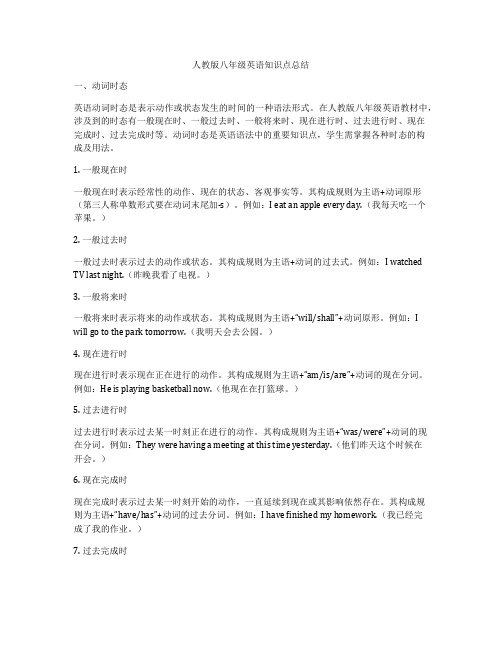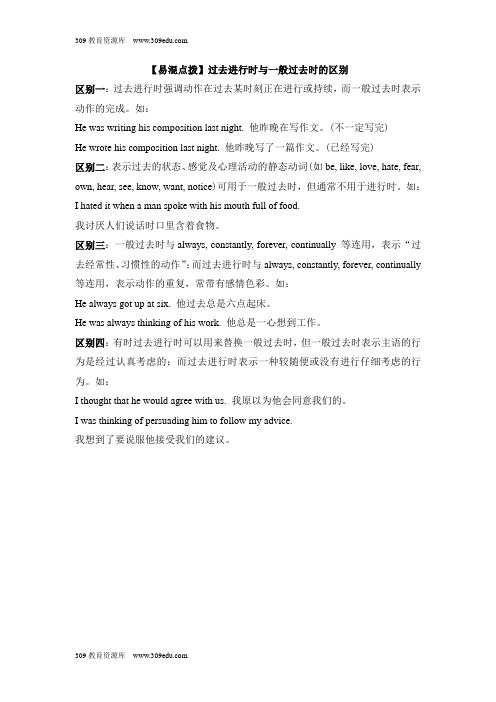英语人教版八年级下册过去进行时
Unit5单词详解课件人教版八年级英语下册

12. _W_a_s_ he _s_tu_d__yi_n_g_ (study) English from 7 to 9 last night?
13. Listen, she i_s_s_i_n_g_i_n_g(sing). 14. He __is_n_’_t_w__o_r_k_i_n_g_ (not work) in the factory
A group of foreign students visited our school. On March 20th, 2020.
Where did it happen?
In our school.
What were you doing? I was reading in the classroom.
3 标志性的时间状语
1)at + 具体时间+过去时间 at that time last night at this time yesterday at 5 o’clock last Sunday
2) at the time of… 在…的时候 3) 过去进行时+when引导的一般过去时的从句(短暂性动词) 4)过去进行时+while引导的过去进行时 (延续性动词)
Mary was reading in the library while Jack was
playing soccer on the playground.
Exercise Two
1. She _w__a_s_d_o_i_n_g_ (do) her homework this time yesterday. 2. The teacher _is__h_e_lp_i_n_g_ (help) his students with their lessons now.
英语人教版八年级下册过去进行时中when和while的区别

1. While John was taking photos, Mary bought a drink. John was taking photos when Mary bought a drink. 2. While John was playing the piano, Mary left the house. John was playing the piano when Mary left the house.
琳达在睡觉的时候,珍妮在做什么? What was Jenny doing _____ while Linda was sleeping? 琳达在睡觉的时候,珍妮在帮助玛丽做 作业。 _______________________, While Linda was sleeping Jenny was helping Mary with her homework.
I. 根据汉语意思完成下列英语句子,每 空一词。 1. 昨天下午五点钟你哥哥在做什么? What _____ was your brother _____ doing at five yesterday afternoon? 2. 昨天我回到家时,我妈妈在洗衣服。 My mother _____ was ________ washing clothes ________ when I ____ got home yesterday.
3. While John was cleaning his room, Mary turned on the radio. John was cleaning his room when Mary turned on the radio. 4. While John was shopping, Mary took the car to the car wash. John was shopping when Mary took the car to the car wash.
人教版英语八年级下册Unit 1-5 单元语法知识梳理

Unit 1 单元语法知识梳理一、情态动词should的用法情态动词should有自己的意义,但不能单独作谓语,只能和其他动词一起构成谓语,表示说话人的态度或看法,后接动词原形。
常见用法有以下几点:1.表示劝告、建议等,意为“应该”,常指根据常理认为对的事或应该去做的事。
当劝某人做或不做某事时,常用“should do sth.”或“shouldn't do sth.”。
should 比must 和ought to 语气更加委婉。
例句:You should brush your teeth before you go to bed.你在睡觉前应该刷牙。
You shouldn't watch TV every day.你不应该每天看电视。
2.通常用来表示现在或将来的责任或义务。
例句:Children should obey their parents.孩子们应该听从他们的父母。
We should respect the old.我们应该尊敬老人。
3.表示推断,意为“应该;可能”。
例句:They should be there by now,I think.我觉得现在他们应该都已经到了。
4.用于第一人称疑问句,询问对方的意愿,表示说话人的一种谦逊、客气、委婉的语气。
例句:Should I open the window? 我可以打开窗户吗?What should we do now? 我们现在该干什么呢?5.表示某种感情色彩,意为“竟会”,常用于以how, why开头引导的特殊疑问句中。
例句:Why should you be so early today? 你今天为什么会如此早?二、反身代词1.反身代词的构成反身代词是一种表示反射或强调的代词。
它由第一人称、第二人称的形容词性物主代词和第三人称代词的宾格加词尾-self或-selves构成。
其构成如下表:反身代词与它所指代的名词或代词形成互指关系,两者在人称和数上应保持一致。
人教版八年级英语知识点总结

人教版八年级英语知识点总结一、动词时态英语动词时态是表示动作或状态发生的时间的一种语法形式。
在人教版八年级英语教材中,涉及到的时态有一般现在时、一般过去时、一般将来时、现在进行时、过去进行时、现在完成时、过去完成时等。
动词时态是英语语法中的重要知识点,学生需掌握各种时态的构成及用法。
1. 一般现在时一般现在时表示经常性的动作、现在的状态、客观事实等。
其构成规则为主语+动词原形(第三人称单数形式要在动词末尾加-s)。
例如:I eat an apple every day.(我每天吃一个苹果。
)2. 一般过去时一般过去时表示过去的动作或状态。
其构成规则为主语+动词的过去式。
例如:I watched TV last night.(昨晚我看了电视。
)3. 一般将来时一般将来时表示将来的动作或状态。
其构成规则为主语+“will/shall”+动词原形。
例如:I will go to the park tomorrow.(我明天会去公园。
)4. 现在进行时现在进行时表示现在正在进行的动作。
其构成规则为主语+“am/is/are”+动词的现在分词。
例如:He is playing basketball now.(他现在在打篮球。
)5. 过去进行时过去进行时表示过去某一时刻正在进行的动作。
其构成规则为主语+“was/were”+动词的现在分词。
例如:They were having a meeting at this time yesterday.(他们昨天这个时候在开会。
)6. 现在完成时现在完成时表示过去某一时刻开始的动作,一直延续到现在或其影响依然存在。
其构成规则为主语+“have/has”+动词的过去分词。
例如:I have finished my homework.(我已经完成了我的作业。
)7. 过去完成时过去完成时表示过去某一时刻之前已经发生的动作。
其构成规则为主语+“had”+动词的过去分词。
例如:She had gone to the park before I arrived.(我到达之前她已经去公园了。
过去进行时专题语法讲解及练习带答案八年级下册英语

过去进行时语法讲解及练习带答案一、过去时与过去进行时的类比?二、过去正在进行时的两种构成讲解:一个句子到从句转变的关键在于把过去时间的标志词用一个表示过去动作的句子来表示三、when 和while引导的过去时间状语从句的区别一、用所给词的正确形式填空1.While I (watch) TV last night, my brother (read)a book.2.At six o 'clock last week, I (play)basketball.3.When I (open)the door, he (cough).4.While he (wait)for the bus last Monday, I (pass)by on my bike.5.____they___(have)a meeting at four yesterday afternoon?6.When I___(come)in the room,he didn’t___(see)me,for he___(read)something.7.At that time yesterday, I (lie)in bed.8.While Bob (play)in the park yesterday, his parents (clean)at home.9.When I was (walk)yesterday evening, I saw Tom (go)out with a bag10.Wendy (communicate)with her teacher after class yesterday11. When I (arrive)at the office last Wednesday, Sam (stand)in front of the office door.12.A strange box ___(arrive) while we __(talk).13. Father __ still ____(sleep) when I ___(get) up yesterday morning.14.When I opened the door at eight o 'clock in the afternoon yesterday , I saw my brother (push) my sister15.On a rainy day last month Lucy was (take)off on a plane to Paris二、选择用When/while填空1.We were reading the newspaper ____ the light went out.2.___ she was watching TV in the sitting room, the bell rang.3.She hurt herself ____ she was getting off the bus.4.____ he arrived, I was having a bath.5.___ I was playing games, my sister was doing her homework.6.Some people waste food, ____ others don’t have enough to eat.7.___ it began to rain, they were playing chess.( )1.When you me at eight o 'clock yesterday afternoon, I for my familyA.were calling ,cooked,B. called,cookingC. called, was cookingD. were calling,cooked( )2What did you yesterday afternoon while I dinner?A.did,was havingB.do,haveingC.were doing,was havingD.do,was having( )3.When I the flowers yesterday morning, it suddenly .A. watered, rainedB. was watering, was rainningC. watered, was rainningD. was watering, rained( )4.When we the exam last Friday, it suddenly rained heavilyA. were takingB. takeC.were takeingD. took( )5.What book ___ you ___ when I ___ you at four yesterday afternoon?A. did, read, was seeingB. did, read, sawC. were, reading, sawD. were, reading, was seeing( )6.When he in hospital last Tuesday, I in Beihai.A.was,traveledB. is,travelC. were,was travelingD. was,was traveling( )7.I the dishes when he on the doorA. washed, was knockingB. was washing, knockedC. washed, knockedD. was washing, was knocking( )8.A girl ____ my pen fall off the table when she ____ me.A. saw, passedB. was seeing, passedC. was seeing, passedD. was seeing, was passing( )9.We ____ for Tom at ten last Sunday. He often kept us ____.A. were waiting, waitingB. were waiting, waitC. waited, waitingD. waited, wait( )10.He to Paris between eight and nine last weekendA. was flyingB.flyC. fliedD. were flying( )11.What was Maria doing at 7 o’clock yesterday evening, Kangkang?She said that she _____ her room.A.cleaned B . is cleaning C. was cleaning .( )12.I called you yesterday evening, but no one answered.Sorry. I________a letter at that time.A. writeB. was writingC. is writing( )13.David, I called you this morning, but nobody answered the phone .I’m sorry. І______football with my friends then.A. playB. will playC. was playing( )14. Hi, Susan, I didn’t see you at the party.Oh, I ______for an English test.A. studiedB. am studyingC. was studying( )15.It was Friday evening.Mr and Mrs.Green_____ready to fly to England.A.are gettingB.getC.were gettingD.got( )16.They_____a football game from7to9last night.A.were watchingB.watchC.watchedD.are watching( )17.He____his father on the farm the whole afternoon last Saturday.A.helpsB.would helpC.was helpingD.is helping( )18.We____for Tom at ten last Sunday.He often kept us______.A.were waiting,waitingB.were waiting,waitC.waited,waitingD.waited,wait( )19.This time yesterday morning Jack_____his bike alone .He_____TV A.repaired,didn’t watch B.was repairing,watchedC.repaired,watchedD.was repairing,wasn’t watching( )20.I asleep yesterday afternoon while the doctor advice.A.fell,was givingB.fall,was givingC. was falling,givenD.fell,were giving参考答案括号内动词的正确形式填空。
人教版英语八年级下册Unit6 (易混点拨)过去进行时与一般过去时的区别

309教育资源库【易混点拨】过去进行时与一般过去时的区别区别一:过去进行时强调动作在过去某时刻正在进行或持续,而一般过去时表示动作的完成。
如:He was writing his composition last night. 他昨晚在写作文。
(不一定写完)He wrote his composition last night. 他昨晚写了一篇作文。
(已经写完)区别二:表示过去的状态、感觉及心理活动的静态动词(如be, like, love, hate, fear, own, hear, see, know, want, notice)可用于一般过去时,但通常不用于进行时。
如:I hated it when a man spoke with his mouth full of food.我讨厌人们说话时口里含着食物。
区别三:一般过去时与always, constantly, forever, continually 等连用,表示“过去经常性、习惯性的动作”;而过去进行时与always, constantly, forever, continually 等连用,表示动作的重复,常带有感情色彩。
如:He always got up at six. 他过去总是六点起床。
He was always thinking of his work. 他总是一心想到工作。
区别四:有时过去进行时可以用来替换一般过去时,但一般过去时表示主语的行为是经过认真考虑的;而过去进行时表示一种较随便或没有进行仔细考虑的行为。
如:I thought that he would agree with us. 我原以为他会同意我们的。
I was thinking of persuading him to follow my advice.我想到了要说服他接受我们的建议。
309教育资源库。
Unit1 ScetionA 3A-4C知识点-人教版英语八年级下册
happen ①(不及物动词〕发生 不能用于被动语态,且不与表示一段时间的状语连用。 主要有以下结构: a.Sth.+happen(s)+地点/时间. 某地/某时发生某事。
Many people expected that the peace talks wouldn't break down. 许多人预料和平谈判ait for sb./sth. to do sth.等待某人/某物做某事 He is waiting for me. 他正等着我。 I'm waiting for the dentist to come.我正在等待牙医的到来。
辨析:thanks to 与thanks for thanks to 由于; 多亏; 并无当面感谢的意思,其后可接名 词或代词 thanks for 因……而感谢后接感谢的原因,其后可接名词、 代词或动词 -ing 形式
Thanks to these kind men, her son was saved. 多亏了这些好心人,她的儿子得救了。
To his surprise, she won first prize. 令他惊讶的是,她获得了一等奖。
注意: “to one’s+表示感情色彩的名词”意 …为“令/ 使某人……的是”, 这一结构的短语还有: to one'sjoy 令/使某人高兴的是 to one's disappointment 令/使某人失望的是 to one's satisfaction 令/使某人满意的是
[拓展] get a surprise 吃惊 in surprise 惊讶地;惊奇地
人教版初中英语八年级下册语法之一 过去进行时
过去进行时的标志词
1.at this/that time 2.at this/that time yesterday (last night/Sunday/week) 3.at+ 点钟+yesterday (last night / Sunday ) 4. when sb/sth. did sth. last evening 5. the whole morning, all day , from nine to ten, while
现在分词的变化规则:直,去,双,改。
过去进行时的句式结构
1
1.肯定句: 主语+was/were+V-ing+其它.
I was watching TV at that time last night. 2.否定句:
主语+was/were+not+V-ing+其它.
I was not watching TV at that time last night. 3.一oing? (have dinner; at seven
yesterday) ___________________________.
过去进行时的用法
1.表示过去某一时间内(正在)进行的动作 如:I was doing my homework at 9 p.m. last Sunday.
3.重复的动作 例: John was always making mistakes.
过去进行时和when连用
A was/were+doing sth when B +did sth.
长时动作
2020人教版初中英语8年级下册unit5语法--过去进行时巩固与提高练习题(含答案)
2020⼈教版初中英语8年级下册unit5语法--过去进⾏时巩固与提⾼练习题(含答案)8年级下册 unit5 语法--过去进⾏时巩固与提⾼练习题I.根据括号内的提⽰词,⽤其适当的形式填空。
1.At five o’clock, my sister and I (watch) TV. There was a very good programme on.2.They (have) meals at eight last night.3.—I went to visit you yesterday evening, but you weren’t in.Where were you then?—Oh, I (walk) my pet dog in the park.4.My mother _________(cook) dinner at six o’clock yesterday evening.5.This morning the coaches (train) the athletes but I’m not sure if they have prepared for the coming match well.6.We (talk) about the book when our teacher came in.7.This morning, the Greens (fix) the pipe, but I am not sure if they have completed it.8.The men (carry) the goods to the village when it suddenly began to rain.9.This morning the Greens (clean) the house, but I am not sure if they have completed it.10.Bob ( listen) to the radio while his sister was cleaning.II.根据汉语意思,翻译句⼦。
人教新目标八年级下册过去进行时讲与练及答案
人教版八年级英语下册过去进行时●语法讲解1.构成:was/were+doing2.用法:过去进行时主要表示过去某一时间或某一段时间正在进行的动作。
如:His father fell and hurt himself while he was riding his bicycle. 他爸爸骑自行车时摔了下来,受伤了。
3.常用时间状语:this morning, the whole morning, all day, yesterday, from nine to ten, last morning, when, while 等。
4.when 与while 的区别(1) 引导时间状语从句时,while 连接的是时间段,而when 连接的多是时间点。
如:What was your father doing while your mother was cooking ?你妈妈做饭时,你爸爸在干什么呢?What was your mother doing when you came back?当你回来时,你妈妈在干什么呢?(2) w hile 可以连接两个并列的句子,而when 不可以。
如:I was trying my best to finish my homework while my sister was watching TV .我当时正在尽力完成作业,而我妹妹正在看电视。
(3) w hen 是特殊疑问词,可以对时间进行提问,而while 不能。
如:When were you born? 你什么时候出生的?过去进行时练习一、用动词的适当形式填空。
1. I (have) my breakfast at half past six yesterday morning.2. Mary (go) over her lessons from six to seven last night. John and Peter (do)the same thing.3. What you (do) at that time? We (watch) TV.4. Was your father at home yesterday evening? Yes,he was. He (listen) to the radio.5. They (not make) a model ship when I saw him.6. it (rain) when you left school? Yes, it . (No, it )7. What your father (do) when he was your age?8. One day, Edison (wait) for a train to arrive, and suddenly a little boy ran to the track(轨道) toplay.9. The three of them were in a hurry because their plane (leave) in five minutes.10. She (make) her dress the whole afternoon.11. While we (wait) for the bus, a girl (run) up to us.12. I (telephone) a friend when Bob (come) in.13. Jim (jump) on the bus as it (move) away.14. We (test) the new machine when the electricity (go) off.15. She (not want) to stay in bed while the others (all, work) in the fields.二、选择题1. I a meal when you me.A. cooked, were ringingB. was cooking, rangC. was cooking, were ringingD. cooked, rang2. He said he to draw a plane on the blackboard at that time.A. triesB. triedC. was tryingD. will try3. While she TV, she a sound outside the room.A. was watching, was hearingB. watched, was hearingC. watched, heardD. was watching, heard4. They a football game from 7 to 9 last night.A. were watchingB. watchC. watchedD. are watching5. What book you when I you at four yesterday afternoon?A. did, read, was seeingB. did, read, sawC. were, reading, sawD. were, reading, was seeing6. It was Friday evening. Mr and Mrs. Green ready to fly to England.A. are gettingB. getC. were gettingD. got7. Lei Feng always of others when he in the army.A. is, thinking, wasB. was, thinking, isC. did, think, isD. was, thinking, was8. A girl my pen fall off the table when she me.A. saw, passedB. was seeing, passedC. was seeing, pastD. was seeing, was passing9. We for Tom at ten last Sunday. He often kept us .A. were waiting, waitingB. were waiting, waitC. waited, waitingD. waited, wait10. He his father on the farm the whole afternoon last Saturday.A. helpsB. would helpC. was helpingD. is helping11. While mother some washing, I a kite for Kate.A. did, madeB. was doing, madeC. was doing, was makingD. did, was making12. “you angry then? The”y “too much noise. ”A. Are, were makingB. Were, were makingC. Are, madeD. Were, made13. He some cooking at that time, so he me.A. did, heardB. did, didn ’t hearC. was doing, heardD. was doing, didn ’t hear14. This time yesterday Jack his bike. He TVA. repaired, didn ’t watc B h. was repairing, watchedC. repaired, watchedD. was repairing, wasn watc’hin t g15. His parents wanted to know how he on with his new classmates.A. was gettingB. getsC. is gettingD. will get过去时中考真题Part 11. —What were you doing this time yesterday?—I on the grass and drawing a picture.A. sitB. satC. am sittingD. was sitting2. While I TV, the bell rang.A. watchB. watchedC. am watchingD. was watching3. —Why didn ’t you answer my telephone yesterday?—Sorry. I a bath.A. tookB. takeC. am takingD. was taking4. While the alien a souvenir, the girl called the police.A. was buyingB. boughtC. buysD. is buying5. —I called you at 6 o'clock yesterday evening, but nobody answered.— I'm sorry. I my friend download the movie Kung Fu PandaⅡwhen the telephone rang,A. would helpB. helpedC. was helping6. I along the road when I saw Peter. So we stopped and had a chat.A. walkedB. was walkingC. would walkD. had walked7. —What did the teacher say just now?— Sorry. I didn ’t catch it. I something else.A. thinkB. will thinkC. was thinkingD. had thought8. When I came back yesterday evening, my brother his homework.A is doing B. has done C. was doing9. M rs White dinner when her son came home.A. is cookingB. was cookingC. are cookingD. were cooking10. —D id you see Mr. Black just now?—Yes. He his car when I met him.A. parkedB. was parkingC. parksD. will park11. —Amy, I called you yesterday evening, but nobody answered the phone.— Oh, I a walk with my mother at that time.A. takeB. tookC. am takingD. was taking12. Y esterday evening, I along the street when I suddenly met my maths teacher.A. walkB. walkedC. was walkingD. am walking13.—Where were you at 7:00 last night?— I to my mom at home.A. writeB. was writingC. wrote14. —Why didn ’t you go to play football with us yesterday afternoon?—I my mother with the housework then.A. helpedB. was helpingC. had helpedD. have been helping15. He when the UFO arrived. He didn ’t wake until the UFO disappeared.A. sleptB. was sleepingC. was doing homeworkD. was singing16. I my homework at nine o'clock last Sunday morning.A. am doingB. was doingC. do17. I was very angry with John—he just when I spoke to him.A. isn ’t listeningB. hasn ’t listenedC. didn ’t listenD. wasn ’t listening18. —I called you at 4:00 yesterday afternoon, but no one answered.—Sorry, I with my friends at that time.A. swimB. swamC. will swimD. was swimming19. Mr. Li us a report on our environment when the earthquake happened in Japan.A. gaveB.is givingC. was giving20. —Mr. Lee to a student when I entered the classroom this morning.- He is very patient he is young.A. talking; butB. talks; thoughC. was talking, thoughD. talked, however21.—Were you at school when he came to see you?—Yes, I a math class.A. hadB. was havingC. am havingD. have22. I met a good friend of mine while I on the street.A. walksB. walkC. was walkingD. am walking23. I when the UFO landed.A. am watching TVB. was watching TVC. have watched TVD. watched TV24. The girl with two cats in the yard when the earthquake happened.A. was playingB. is playingC. are playingD. were playingPart 21. Paul and I tennis yesterday. He did much better than 1.A. playB. will playC. playedD. are playing2. A big party was held in NO.18 Middle School last night, the teacher with students singing and dancing happily at the party.A. isB. wasC. areD. were3. Mr. Black is going to marry a girl he in Japan last year.A. meetsB. metC. has metD. would meet4. He went into his room, the light and began to work.A. has turned onB. turned offC. turned onD. has turned off5.—W hat did Mr. Smith do before he came to China?—He in a car factory.A. worked B.works C.is working D.will work6. —Have you ever been to Hong Kong?—Yes, I ___there last month.A. went toB. have beenC. went7. This morning I had hardly got to my school when it to rain.A. had begunB. was beginningC. beganD. begins8.—Y ou have found your lost umbrella, haven ’t you?—Yes. I it behind the door this afternoon.A. have foundB. will findC. found9. Tom, along with three other boys, seen playing football a moment ago.A. isB. wasC. areD. were10. Ten minutes ago, there an eraser, a pen and some books on the desk.A. wasB. wereC. is11. —How was your trip to Hang Zhou, Jim?—Great! We to Xixi National Wetland Park.A. goB. am goingC. will goD. went12. –Do you know who cleaned the blackboard, Tina?-- Yes. John .A. doB. doesC. did13. The last time I to the cinema was two years ago.A. goB. have goneC. have beenD. went14. —Have you ever been to Canada?— Yes, I there last year with my parents.A. have beenB. have goneC. wentD. go15. I called you, but nobody answered. Where you?A. isB. areC. wasD. were16. ---Have you ever been to Shanghai?---Yes. I there a few months ago.A have been B. went C. have gone17. What’s the best present you have ever ?A. receivedB. receivesC. receiving18.—Lin Kai, hand in your homework, please.—Oh, sorry. I it at home this morning.A. was leavingB. has leftC. will leaveD. left19. I'm now in New York with my friend Jenny. We by plane on Monday.A. arriveB. arrivedC. are arrivingD. will arrive20.—Guess What! The great movie is on in the cinem.a一Nothing n ew.I it with my parents on the first day.A. saw B.see C.will see D. have been21. If it had been fine yesterday, we could have watched that air show. But it all day.A. has rainedB. had rainedC. rainedD. rains22. –When your mother you that blue dress, Lucy?–Sorry, I really can ’t rem M e a m ybert.wo or three weeks ago.A. will; buyB. does; buyC. did; buy23. -I ’v e got a ticket for the basketball game tonight.-Cool!How you it?A. had, gotB. did, getC. were, gettingD. will, get24. Hello! I'm very glad to see you. When you here?A. did; arriveB. will; arriveC. have; arrivedD. are; arriving25. —I have to be off right now.—What a pity! I you could stay a little longer with us.A. thinkB. am thinkingC. thought26. Tom was so careless that he his right arm when he was riding to school.A. hurtsB. hurtC. has hurtD. had hurt27. —I something wrong just now. May 1 use your eraser?—Of course. Here you are.A. writeB. wroteC. am writing过去进行时练习一、用动词的适当形式填空。
- 1、下载文档前请自行甄别文档内容的完整性,平台不提供额外的编辑、内容补充、找答案等附加服务。
- 2、"仅部分预览"的文档,不可在线预览部分如存在完整性等问题,可反馈申请退款(可完整预览的文档不适用该条件!)。
- 3、如文档侵犯您的权益,请联系客服反馈,我们会尽快为您处理(人工客服工作时间:9:00-18:30)。
一、教学设计:
知识与技能
1、学习初中阶段的一个重要的时态“过去进行时”。
2、用过去进行时编写对话。
3、学习课文中的知识点。
过程与方法
1、通过小组合作,兵教兵的形式学习过去进行时。
2、通过PK的形式高效学习对话。
3、在学习的过程中,教师发现易错点,加强巩固。
情感、态度和价值观
1、通过PK,培养学生学习兴趣,激发学生的求知欲。
2、通过小组合作的形式让学生学会分享,学会竞争。
二、学情分析:
初中生的学习心理特点:(1)兴趣:对英语普遍感兴趣,但有很大的不稳定性,好奇心强,求知欲旺盛,已不满足教师对课文的简单重复。
(2)记忆:对刺激记忆手段多的知识记忆深刻,遵从记忆规律。
(3)思维:偏重于形象思维,对片面,零碎的材料尚缺乏一定的概括分析能力。
(4)评价:主要通过他人评价初步形成对自己的评价,所以很在乎他人的评价;自我认识较模糊、片面,但自我意识却不断增强。
因此,在本学科的教学过程中,在注重启发引导,培养学生分析、概括能力的同时,更要注重教学方法的灵活性,通过“三模六步”教学法,情景交际法,激发学
生学习的兴趣,让学生乐于接受,易于接受。
三、重点和难点:
本堂课的内容主要分为两部分
重点:过去进行时态和课文中出现知识点中的易错点
难点:过去进行时态的应用
四、教学新设计
教学方法:“三模六步法”。
学习方法:自主学习合作探究展示的学习方式。
三模块:自主体验、合作探究、展示反馈
五、教学流程
1.导入
教师以一个现场歌唱的视频导入,导出what were you doing when I listened to music?是本节课的语法句型,过去进行时。
策略:通过视频吸引学生的眼球,既让学生进入状态,又让学生初步了解本节课的语法。
2.合作交流
以小组合作的形式对本语法的知识进行梳理,归纳总结,同时发现问题,确定重难点。
策略:在这一环节,通过学生的亲身体验和主动参与来完成,学生们通过小组合作共同探讨,解决共性问题。
3. 汇报展示
让一名学生当小老师,四名学生板书,下面的学生说出重难点,易错
点,并针对以上内容举一反三,发复训练。
真正达到查漏补缺的目的。
策略:学生随时质疑,师生互动,生生互动,师生共同唱一台戏。
4.巩固运用
通过这一pk活动设计,不仅仅是活跃了课堂气氛,更重要是在活动中运用知识,熟练的掌握本节课的重点语法和句型。
策略:让学生在竞争中学到更多的相关知识。
5. 拓展提升
以链接中考的形式拓展延伸,总结规律和做题方法,拓展知识,丰富知识。
策略:让更高一个层度的学生有更大的收获。
6.当堂检测。
针对重难点、易错点。
教师准备了检测题。
我们坚决反对多做题才是复习的错误观点,每一道习题都是经过精挑细选。
策略:通过当堂检测让学生和老师都能了解学生的掌握情况。
7.作业
通过作业,进一步了解学生的掌握情况,让学生更自信的学习英语。
